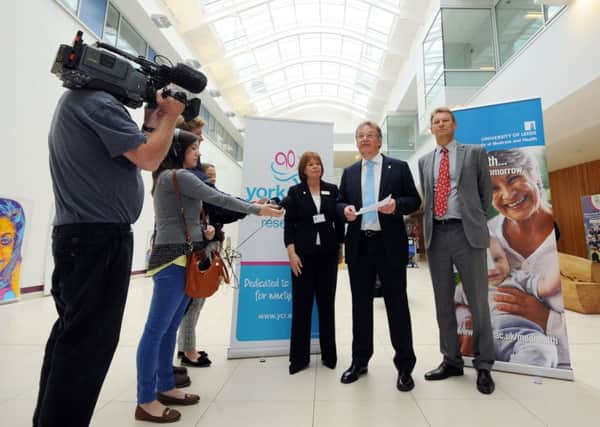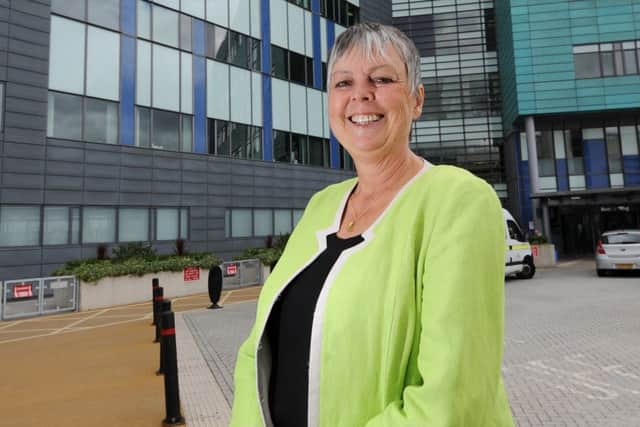£5million cancer research project to tackle ‘alarming’ north-south cancer divide


The Yorkshire Cancer Research (YCR) charity has revealed today that it is investing £5million in a five-year programme of research to address “extremely alarming” differences between mortality and cancer incidence rates.
Recent figures from the Office of National Statistics show that Yorkshire has the third highest cancer rates in England at 617 cases per 100,000 people, behind only the north west and north east. London has the lowest rate at 571. Yorkshire also has higher than average mortality rates for many common cancers including lung, bladder and cervical cancer.
Advertisement
Hide AdAdvertisement
Hide AdYCR’s investment, in partnership with the University of Leeds and Leeds Teaching Hospitals NHS Trust, will support research to identify key priorities in the county, better aid patients after diagnosis, improve transitions in care and develop new therapies for early stage clinical trials.


Charles Rowett, chief executive at YCR, said: “The north-south divide in cancer incidence and mortality rates is extremely alarming.
“National funding for cancer research is currently concentrated far too heavily in London and the south-east and is therefore failing to address the enormous disparities in cancer outcomes that exist.”
He explained that there are many reasons for the region’s cancer issues, including high levels of smoking and alcohol consumption as well as high obesity rates but believes there are also “distinct inequalities” in access to the best treatment and care.
Advertisement
Hide AdAdvertisement
Hide Ad“It is vital that charities, the NHS, universities and other organisations work together to understand more about what causes these problems and increase their investment in resources and initiatives that will address these issues,” he added.
Yorkshire accounts for 8.3 per cent of the UK population but receives just 4.2 per cent of the total amount of charity money spent on cancer research in the country, according to the Association of Medical Research Charities.
The new research programme is said to be the most comprehensive body of work funded by YCR in its 90-year history.
It will be led by top researchers including Professor Paul Stewart, Dean of Medicine and Health at the University of Leeds, and Professor Julia Brown, director of the Leeds Institute of Clinical Trials Research.
Advertisement
Hide AdAdvertisement
Hide AdProf Stewart explained that the research aims to focus on a growing gap in cancer research, while the funding pledged so far will enable them to enlist the “brightest and best” experts in the field.
He said: “In recent years, funding priorities of major cancer charities and research councils have moved away from patient outcome-focused research to discovery science. We aim to tackle this unmet need, addressing the full circle of a cancer patients’ experience, from diagnosis to treatment and care.”
Studies will be undertaken to improve diagnostic and screening services so that more people are diagnosed at an early stage, when cancers are easier to treat, and to ensure all patients have equal access to gold standard treatments.
Dr Yvette Oade, chief medical officer at Leeds Teaching Hospitals NHS Trust, said: “We are absolutely committed to addressing the issues in our region and this funding will play a vital role in helping the NHS deliver the best possible treatment and care.”
Advertisement
Hide AdAdvertisement
Hide AdIt is also thought that there are variations in cancer incidence, mortality and survival rates within the county itself, with hotspots in areas such as Hull and parts of West and South Yorkshire.
Around 527 people are diagnosed with cancer in Yorkshire every week, showing there is a real and present need for cancer research. There are thought to be 200 clinical cancer trials ongoing at any one time.
YORKSHIRE CANCER PATIENT BACKS MOVE
A routine doctor’s appointment to give blood was all that it took for doctors to become concerned for Barbara Hibbert.
The 57-year-old, from Harrogate, was sent for an emergency referral by her GP after her sample was found to be lacking in red blood cells. Within weeks she was diagnosed with stage four bowel cancer.
Advertisement
Hide AdAdvertisement
Hide AdThe teacher of more than 30 years underwent two operations – a tumour was cut from her liver and a part of her bowel was removed – and a lengthy course of chemotherapy began last year.
Fast forward 12 months and Dr Hibbert, who is married with two children, was given the news that she is cancer-free.
“It’s been full-on really, I’ve kept working throughout,” she said. “My daughters both live in London and my husband works in Durham, so between them they’ve made sure there’s somebody at home for me after I’ve been in hospital.”
By her own admission she has had “gold standard” treatment, although her cancer has a 50 per cent chance of returning.
Advertisement
Hide AdAdvertisement
Hide AdBut after hearing of the differences in cancer incidence and mortality rates between the north and south of England, she is backing the move by Yorkshire Cancer Research to fund a £5million programme of research in the region.
Dr Hibbert said: “I was quite shocked when I heard the statistics. The people of Yorkshire deserve to have good treatment as much as anyone anywhere else.”
She added that she is also now well aware of the impact that lifestyle has on your susceptibility to cancer, having lost three stones in weight since her diagnosis. She said: “I had an incentive, I now have a far healthier lifestyle but it’s about getting that message out there.”